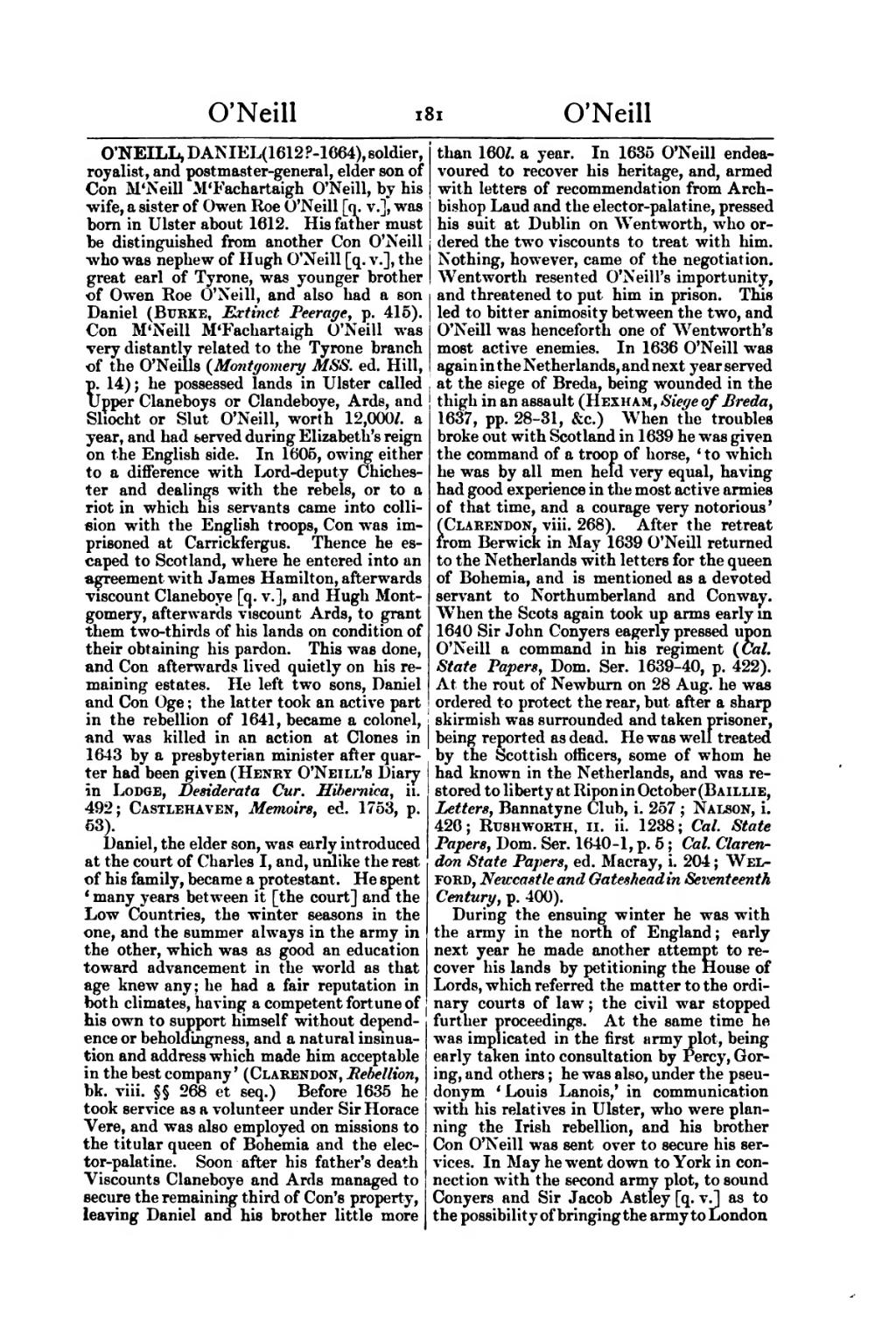O'NEILL, DANIEL (1612?–1664), soldier, royalist, and postmaster-general, elder son of Con M'Neill M'Fachartaigh O'Neill, by his wife, a sister of Owen Roe O'Neill [q. v.], was born in Ulster about 1612. His father must be distinguished from another Con O'Neill who was nephew of Hugh O'Neill [q. v.], the great earl of Tyrone, was younger brother of Owen Roe O'Neill, and also had a son Daniel (Burke, Extinct Peerage, p. 416). Con M'Neill M'Fachartaigh O'Neill was very distantly related to the Tyrone branch of the O'Neills, (Montgomery MSS. ed. Hill, p. 14) : he possessed lands in Ulster called Upper Claneboys or Clandeboye, Ards, and Sliocht or Slut O'Neill, worth 12,000l. a year, and had served during Elizabeth's reign on the English side. In 1605, owing either to a difference with Lord-deputy Chichester and dealings with the rebels, or to a riot in which his servants came into collision with the English troops, Con was imprisoned at Carrickfergus. Thence he escaped to Scotland, where he entered into an agreement with James Hamilton, afterwards viscount Claneboye [q. v.], and Hugh Montgomery, afterwards viscount Ards, to grant them two-thirds of his lands on condition of their obtaining his pardon. This was done, and Con afterwards lived quietly on his remaining estates. He left two sons, Daniel and Con Oge; the latter took an active part in the rebellion of 1641, became a colonel, and was killed in an action at Clones in 1643 by a presbyterian minister after quarter had been given (Henry O'Neill's Diary in Lodge, Desiderata Cur. Hibernica, ii. 492; Castlehaven, Memoirs, ed. 1753, p. 63).
Daniel, the elder son, was early introduced at the court of Charles I, and, unlike the rest of his family, became a protestant. He spent 'many years between it [the court] and the Low Countries, the winter seasons in the one, and the summer always in the army in the other, which was as good an education toward advancement in the world as that age knew any; he had a fair reputation in both climates, having a competent fortune of his own to support himself without dependence or beholdingness, and a natural insinuation and address which made him acceptable in the best company' (Clarendon, Rebellion, bk. viii. §§ 268 et seq.) Before 1635 he took service as a volunteer under Sir Horace Vere, and was also employed on missions to the titular queen of Bohemia and the elector-palatine. Soon after his father's death Viscounts Claneboye and Ards managed to secure the remaining third of Con's property, leaving Daniel and his brother little more than 160l. a year. In 1635 O'Neill endeavoured to recover his heritage, and, armed with letters of recommendation from Archbishop Laud and the elector-palatine, pressed his suit at Dublin on Wentworth, who ordered the two viscounts to treat with him. Nothing, however, came of the negotiation. Wentworth resented O'Neill's importunity, and threatened to put him in prison. This led to bitter animosity between the two, and O'Neill was henceforth one of Wentworth's most active enemies. In 1636 O'Neill was again in the Netherlands, and next year served at the siege of Breda, being wounded in the thigh in an assault (Hexham, Siege of Breda, 1637, pp. 28–31, &c.) When the troubles broke out with Scotland in 1639 he was given the command of a troop of horse, 'to which he was by all men held very equal, having had good experience in the most active armies of that time, and a courage very notorious' (Clarendon, viii. 268). After the retreat from Berwick in May 1639 O'Neill returned to the Netherlands with letters for the queen of Bohemia, and is mentioned as a devoted servant to Northumberland and Conway. When the Scots again took up arms early in 1640 Sir John Conyers eagerly pressed upon O'Neill a command in his regiment (Cal. State Papers, Dom. Ser. 1639–40, p. 422). At the rout of Newburn on 28 Aug. he was ordered to protect the rear, but after a sharp skirmish was surrounded and taken prisoner, being reported as dead. He was well treated by the Scottish officers, some of whom he had known in the Netherlands, and was restored to liberty at Ripon in October (Baillie, Letters, Bannatyne Club, i. 257; Nalson, i. 426; Rushworth, {sc|ii}}. ii. 1238; Cal. State Papers, Dom. Ser. 1640–1 , p. 5; Cal. Clarendon State Papers, ed. Macray, i. 204; Welford, Newcastle and Gateshead in Seventeenth Century, p. 400).
During the ensuing winter he was with the army in the north of England; early next year he made another attempt to recover his lands by petitioning the House of Lords, which referred the matter to the ordinary courts of law; the civil war stopped further proceedings. At the same time he was implicated in the first army plot, being early taken into consultation by Percy, Goring, and others; he was also, under the pseudonym 'Louis Lanois,' in communication with his relatives in Ulster, who were planning the Irish rebellion, and his brother Con O'Neill was sent over to secure his services. In May he went down to York in connection with the second army plot, to sound Conyers and Sir Jacob Astley [q. v.] as to the possibility of bringing the army to London
